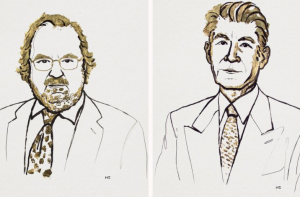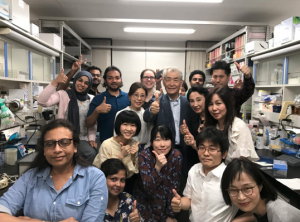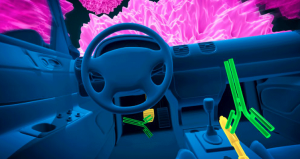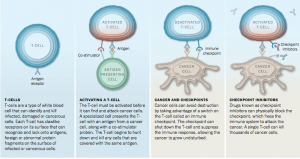
James P. Allison (left) and Tasuku Honjo (right). Niklas Elmehed/Nobel Media | https://www.nobelprize.org/prizes/medicine/2018/summary/
WHO
Two cancer immunologists were in a “state of shock” about having achieved “every scientist’s dream” when they were named Laureates. Two researchers, James P. Allison from Texas and Tasuku Honjo from Japan, have jointly been awarded the Nobel Prize in Physiology or Medicine for 2018. Although from two continents, the two have spent over half a century making key discoveries in the field of immunotherapy for cancer with the common goal to save more patients.

Nobel Laureate Tasuku Honjo with his team at Kyoto University in Japan. – Photo By Tasuku Honjo |https://twitter.com/NobelPrize/status/1046697841509498883
Even though the first Nobel Prize in Medicine was awarded in 1901 , this is surprisingly the first time that researchers have been acknowledged for their work on cancer treatments. For over 100 years, researchers have attempted to get the human body to fight cancer on its own using the immune system. Both, Allison and Honjo, have been critical to this progress of providing new hope to patients through Immunotherapy.
WHAT
Their work developed a new method of treating cancer using drugs, they discovered, called checkpoint inhibitors. This method is the fourth option for cancer treatments, along with radiation, chemotherapy and surgery. Using checkpoint inhibitors, we can get our immune system to protect us from Cancer and attack it altogether— a process that can’t occur naturally without these drugs.

“Using the metaphor of a car, the green structures here illustrate how antibodies can take the brake off of the body’s immune system.”
THE NOBEL COMMITTEE FOR PHYSIOLOGY OR MEDICINE. ILLUSTRATOR: MATTIAS KARLÉN
By discovering a mechanism to disengage the “brakes that prevent the immune system from attacking cancer, the researchers’ have revolutionized cancer treatment, said the Nobel Assembly at Sweden’s Karolinska Institute.
THE SCIENCE
“We can cure cancer with it” – Klas Kärre, member of the Nobel Committee, on the life-changing possibilities of this year’s Nobel Prize awarded discovery.
The video: https://www.youtube.com/watch?v=dCm-Gp2qoaM&feature=youtu.be
Although the human immune system attacks harmful substances in our bodies, it is sometimes “inhibited” by certain proteins that prevent it from doing its job. Although this has been known to scientists for decades, Allison and Honjo are part of a select few to produce successful subsequent research on how these proteins can promote a process where T-cells, white blood cells, attach to the deadly pathogen cells and trigger an immune response. Allison and Honjo were curious about how the “brake function” in these proteins can be controlled to propel the immune system to fight back against cancer pathogens.

Research Model Summaries |https://www.nytimes.com/2018/10/01/health/nobel-prize-medicine.html
To achieve this mutual goal, “Allison researched a protein that previously had been identified as a restraint on the immune system, while Honjo discovered another protein that keeps the immune system at bay,” stated a member of the Nobel Committee. Thus far, the therapies have proven useful for fighting late-stage lung cancer, renal cancer, lymphoma and melanoma. The two scientists now plan to create new medicines adjoining their research in the hopes that many more can be cured.
Even though there are shortcomings such as its expensive cost which can reach upwards of $100,000 for one years worth of treatment, the Nobel Prize Laureates have established an entirely new principle for cancer therapy — one that can save millions more.
By Parwaz Brar of SCIE 300 109.
